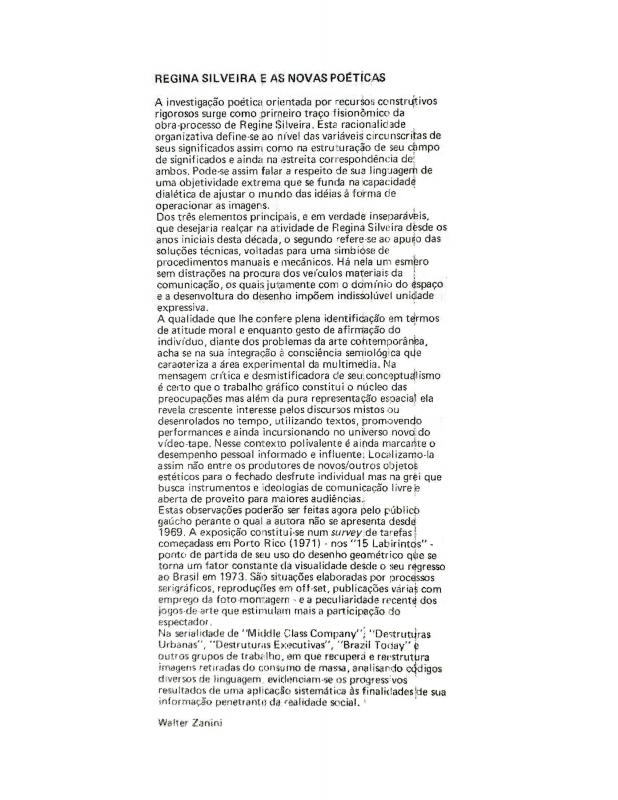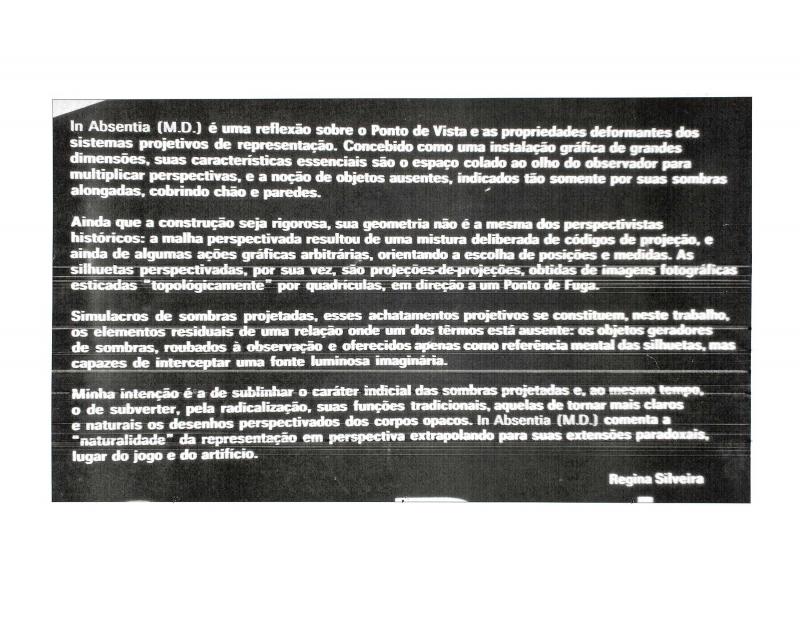The German art critic Wolfgang Pfeiffer (1912–2003) emigrated to Brazil in 1948, where he became involved in the art world in São Paulo as a result of the different professional positions he held. He was, for example, Technical Director of the Museu de Arte Moderna de São Paulo from 1951 to 1959, and played the same role at the 3rd and 4th São Paulo Biennial. He was the Cultural Attaché at the German Consulate in São Paulo (1960–77); he was chairman of the board of the Goethe Institut (1970–82); he was Director of the Museu de Arte Contemporânea da Universidade de São Paulo (1978–82); and he held teaching positions at universities in Greater São Paulo. From the very beginning of his career, he focused on a trenchant reading of baroque art (in its European, Brazilian, and Latin American versions); he also studied the twentieth-century historic avant-garde, which made him ideally suited to comment on the work of Regina Silveira.
“Simulacros” was held in November-December 1984 at the Museu de Arte Contemporánea, which is part of the Universidade de São Paulo. The exhibition in fact consists of the thesis that Regina Silveira presented to the Escola de Comunicações e Artes (ECA-USP) where she had been a teacher since 1974.
The series “Simulacros” is undoubtedly a development of the earlier idea of dematerialization (that had emerged in Argentina in the mid-1960s). There is an article by Professor Walter Zanini, “Regina Silveira e as novas poéticas” [doc. no. 1110655], that discusses the “art-games” that encourage the viewer to get involved in the work of art; the artist also analyzes various visual language codes, reclaiming and restructuring images drawn from the field of mass consumption or, in this case, the history of art. It should be noted that the title of the series is powerfully evocative of the impact created by the French theoretician Jean Baudrillard who, in 1981, published his philosophical treatise Simulacra and Simulation in which he explores the links between reality and the symbols of postmodern society.
Regina Silveira (b. 1939) began her career as a painter, printmaker, and draughtswoman in the 1960s in Porto Alegre, the capital of Rio Grande do Sul. A trip to Europe sparked her interest in the potential of geometric forms. As a teacher in Puerto Rico in 1969, Silveira was torn between the development of local handcrafts and her interest in modern means of technical reproduction. During her stay on the Island of Enchantment (Puerto Rico) she also became interested in the so-called “dematerialization” of the object. On her return to Brazil in 1973, she settled in São Paulo. During the 1970s she produced her series Destruturas Urbanas [Urban Destructions], Executivas [Women Executives], and Brazil Today, that use books, albums, and other elements to explore the environment, bureaucracy, and power. For additional information on the artist, see Silveira’s text “[In absentia (M.D.) é uma reflexão]” [doc. no. 1110654].


